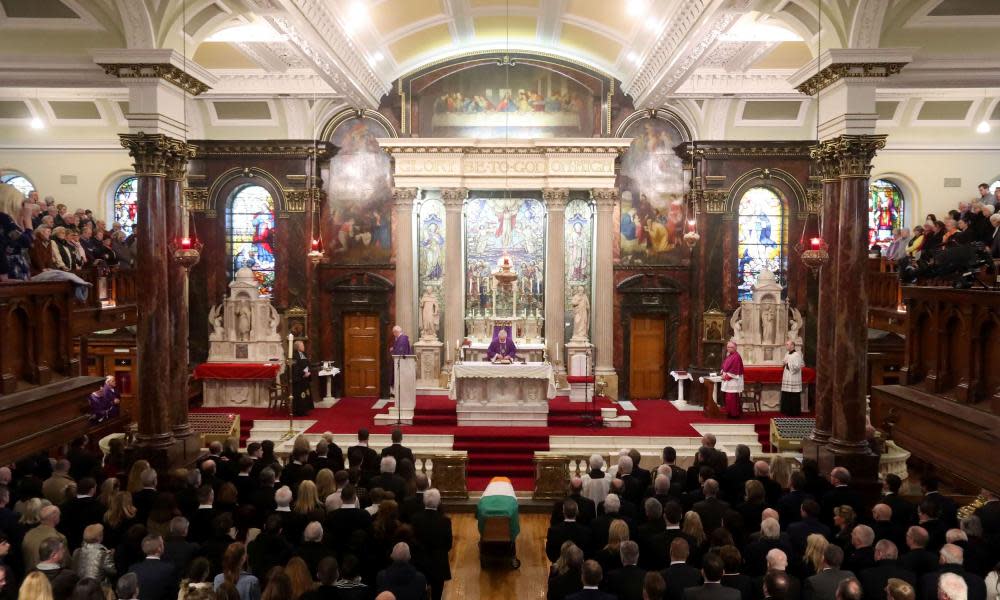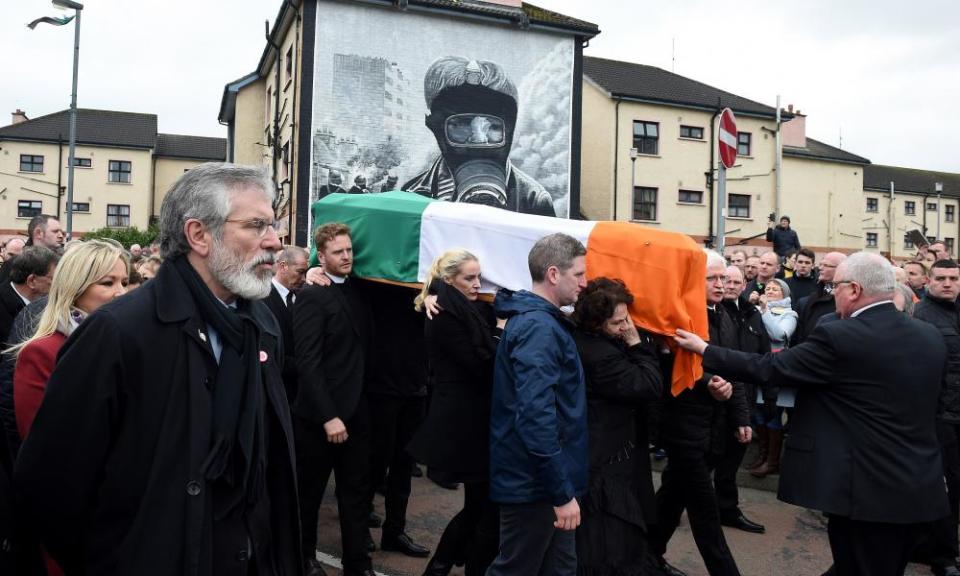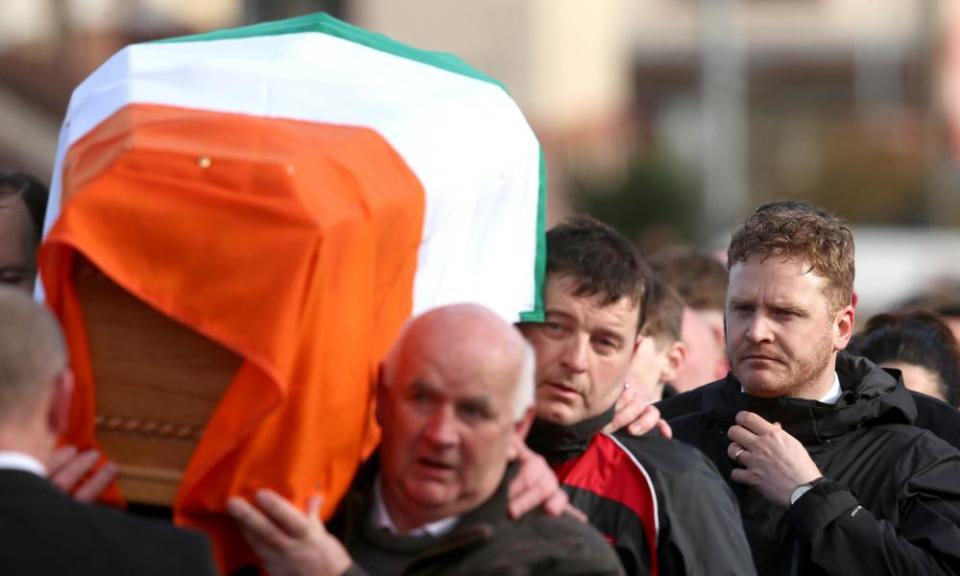Bill Clinton urges leaders at Martin McGuinness funeral to finish his work

Bill Clinton has urged the leaders of Northern Ireland’s political parties, gathered at a funeral mass for Martin McGuinness, to complete his work and restore the power-sharing government.
Some mourners outside wept and many broke into spontaneous applause during the former US president’s oration at the end of the service inside St Columba’s church in Derry as he recalled his and the former IRA chief of staff’s role in the peace process.
Clinton, who had earlier lightly touched the coffin draped in the Irish tricolour said McGuinness had “risked the wrath of his comrades and the rejection of his enemies”.
Imploring the parties and the people who elect them to the Northern Ireland assembly to reach another compromise, Clinton told mourners: “If you want to continue his legacy, go and finish the work he has started.”
Referring to McGuinness’ once unthinkable friendship with the late unionist leader, Rev Ian Paisley, Clinton said: “It was great he got a word in edgeways. I never could”.
He lightened a sombre atmosphere inside the church and in the surrounding streets by referring to the deep bond between McGuinness and his close ally and Sinn Féin leader, Gerry Adams.
Clinton joked that Adams was “married” to McGuinness for nearly as long as his widow Bernie, which provoked laughter both inside and outside St Columba’s.
He also referred to the presence of Arlene Foster, the Democratic Unionist leader and first minister in the last power-sharing coalition that fell apart in acrimony this year.
Praising her for attending the service despite criticism from some families of IRA victims, and recalling that she too had almost been killed as a schoolgirl in an IRA bomb attack, Clinton said: “First minister, thank you for being here. I know your life has been marked in painful ways by the Troubles.”

In a symbolic scene as mourners filed out shortly after Clinton’s speech, Foster and the new leader of Sinn Féin in Northern Ireland, Michelle O’Neill, reached across the church pews to shake hands.
Clinton remains popular not only in Derry but across Ireland for his role in hosting talks and encouraging the leaders of Northern Ireland’s parties to secure the 1998 Good Friday agreement. It took half an hour for him to get back into his car as he was mobbed outside the church by well-wishers wanting to shake his hand.
Before the funeral, Barack Obama had also issued a statement praising McGuinness as a “man who had the wisdom and courage to pursue reconciliation for his people”.
Other political leaders in attendance included the current Irish president, Michael D Higgins, his predecessor, Mary McAleese, and the taoiseach, Enda Kenny.
McGuinness died surrounded by family in the early hours of Tuesday morning in Derry’s Altnagelvin hospital. He was suffering from a rare genetic condition, amyloidosis, which affects vital organs including the heart.
During the requiem mass Father Michael Canny said in his homily that the presence of unionist leaders such as Foster and the outgoing Ulster Unionist chief, Mike Nesbitt, was the ultimate legacy for Martin McGuinness.
“There are people in this church today whose presence would have been unthinkable only a generation ago,” he said.
“They have forged working relationships with Martin McGuinness. They have built friendships with him. They have occupied Stormont’s benches alongside him. Some have even sat in government with him. You are all very, very welcome.

“The presence of those political rivals and opponents among you, who have come to pay their respects this afternoon, is the most eloquent testimony to the memory of Martin McGuinness.”
At the republican plot in Derry’s City cemetery, Adams delivered his own oration in praise of his co-strategist who helped guide the republican movement away from armed struggle toward democratic politics and compromise with unionists.
Adams’s speech stressed McGuinness’s adherence to his revolutionary republican principles right to the end of his life, and his outreach to the unionist community.
In the traditional part of his oration, Adams said: “Martin McGuinness was not a terrorist. Martin McGuinness was a freedom fighter … Martin believed that the British government’s involvement in Ireland, and the partition of our island, are the roots of our divisions. He was absolutely right about that. The British government has no right whatsoever to have any involvement in Ireland.”
He also told mourners that by meeting the Queen and shaking hands with her, his friend had shown how “to reach out beyond your own base” and in particular to the unionist community.
McGuinness’ funeral was the closest thing Derry – the city where the Troubles began at the end of the 1960s – has experienced to a state occasion.
It began at his family home in Westland Avenue, not far from the Bogside district where murals commemorate milestone events from the Troubles, such as the 1972 Bloody Sunday massacre of civilians by the Parachute Regiment.
Before the cortege set off for the church Alastair Campbell, Tony Blair’s spokesman at Downing Street during the critical years of peace negotiations, paid his respects to the McGuinness family at their home.
As the procession followed by thousands of people came close to St Columba’s one of the three pipers leading the cortege played a poignant Irish tune, a lament written by Thomas Moore originally to commemorate a number of his friends from Trinity College Dublin who had fought and were killed in the 1798 United Irish rebellion against British rule.
The Minstrel Boy has been adopted by all sides over the years, including Irish regiments of the British Army, the Irish defence forces and US military units. The penultimate verse includes the words: “The minstrel boy to the war is gone/In the ranks of death ye may find him.”
Given that the Irish military marching tune has become an ecumenical way to express the futility and sacrifice of conflict it seemed entirely apposite as a man of war who became a man of peace was about to be taken on the final leg of a remarkable journey.

 Yahoo News
Yahoo News 
